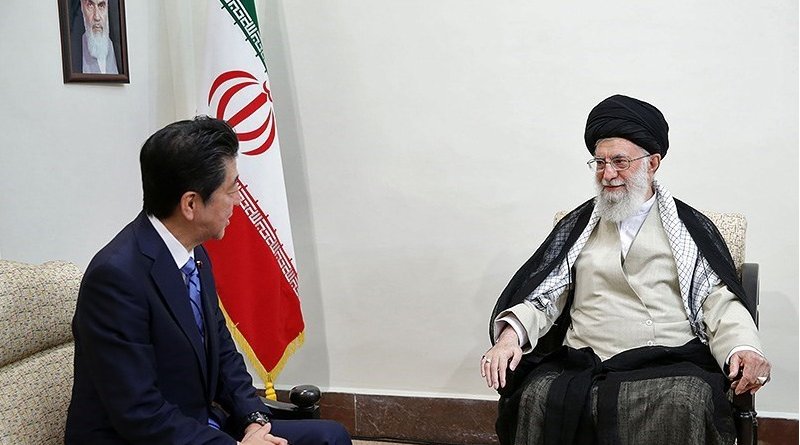Abe’s Difficult Role In The US-Iran Tangle – Analysis
By Observer Research Foundation
In trying to maintain a strategic alliance with the US and the Middle East, Japan seems to be standing at a crossroad.
By K. V. Kesavan and Simran Walia
Since 1952, successive Japanese governments have always maintained that cordial relations with the countries of the Middle East are closely bound up with the peace and economic well-being of Japan. Yet, no other region perhaps has posed a greater challenge to Japanese diplomacy in the post-war years. The region which accounts for more than 80% of Japan’s energy requirements has been in a constant state of political and economic turmoil. For Japan, what has further complicated the situation is its security alliance with the Unites States whose global strategic interests are deeply involved in the Middle East. Quite often, Japan had to subordinate its vital economic (energy) interests to the demands of its alliance with the US. The case of Iran provides a classic example to illustrate such a conflict of interests between the two.
Both Japan and Iran are commemorating their 90th diplomatic anniversary this year. Traditionally, Iran has been a major supplier of oil and gas to Japan. In the initial years, there was no difficulty for Japan to pursue its own independent energy policy with Iran. But following the 1979 Islamic Revolution, when the US was losing its influence in Iran, Japan’s energy imports from that country came under the strict US scrutiny. During the Iran-Iraq war, the US warned that the continued oil purchases could boost Iran against Baghdad.
Again in 2000, Japan acquired priority rights in negotiations for developing Iran’s Azadegan oil fields worth an estimated 26 billion barrels in reserves. Japan attached great importance to this deal as it was expected to ease the energy situation at home. In 2004, though it made 75% of the investment in the project, it was forced by the US to reduce it to 10% in 2006 and ultimately to withdraw from the project altogether in 2010. It was a very disappointing experience for Japan and what disturbed everybody was that ultimately China took advantage of the project.
In 2015 when the Iran nuclear agreement was signed by the US, Britain, Germany, France, China, Russia and Iran, Japan welcomed it with considerable optimism though it was not a party to it. Tokyo hoped that the agreement would contribute to peace and stability in the Middle East. Further, it also hoped to pursue normal relations with Iran with enhanced energy trade.
But Japan’s optimism proved to be short-lived since President Donald Trump decided to withdraw from the deal rather suddenly leading to heightening tensions in the region. While Russia and China are close to Iran, other European signatories are in serious disagreement. Japan which is not a party to the agreement has since 2015 improved its economic relations with Iran. In addition, Prime Minister Shinzo Abe has been having regular summit meetings with President Hassan Rouhani at the UN for six years consecutively since 2013. In 2016, both Iran and Japan signed an investment agreement for boosting their economic ties. About 30 Japanese companies are investing in Iran for importing crude oil.
Following Trump’s enforcing sanctions against Iran, Tehran threatened to block the Strait of Hormuz in the Persian Gulf. In response, Trump dispatched an aircraft carrier and B-52 bombers to the region. Amidst such a threatening scenario, if Iran were to withdraw its commitment to the nuclear deal, it could lead to total instability in the region.
It was against this background that Trump made an official visit to Japan in May 2019 and it provided an opportunity for the two leaders to discuss the deepening crisis In Iran. Considering the cordial relations that Japan has maintained with Tehran, Trump encouraged Abe to visit Tehran with a view to meeting the Iranian leaders to explore the possibilities of finding a way to ease the current tensions.
Abe’s visit carried considerable symbolic significance as his visit came as the first by a Japanese Prime Minister in 41 years. It was in 1978 that Prime Minister Takeo Fukuda had visited Iran. Abe visited Iran from 12 to 15 June with the objective of trying to de-escalate the crisis situation. He met with Iranian leaders, including President Hassan Rouhani. He told them: “Amid rising tension, it is essential for Iran to play a constructive role in strengthening peace and stability in the Middle East, so that this region will not be destabilised further or accidental clashes will not happen.”
Japan believes that it is very important to ensure that Iran does not resume its nuclear programme at all costs. In that context, it is equally essential to listen to their views to find some meeting points. Many believe that the present crisis arose largely because of Trump’s unilateral decision to opt out of the nuclear deal. It has serious implications for both Iran and the US. As for Iran, its people have suffered serious economic hardships because of the crippling sanctions. Any government at Tehran would like to wriggle out of the present excruciating plight. As for the US, Trump will soon be involved in the next Presidential election campaign and Iran will figure as an important talking point.
In such a complex situation, one wonders whether Abe’s role could really be very limited. Nevertheless, Trump is scheduled to visit Osaka soon for attending the G20 meeting. It could provide a good opportunity for Abe to convey the viewpoints of Iran to him and make some useful suggestions for a way forward.

